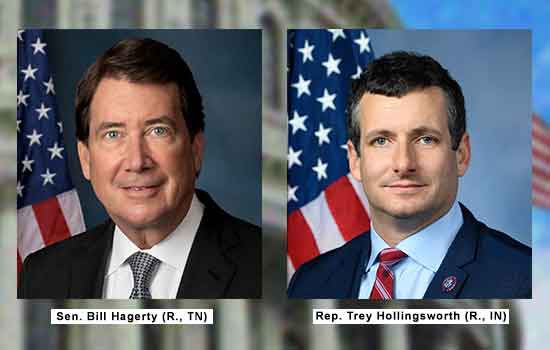D.C. blockchain policy discussion around stablecoins is heating up. Last week, two Republican legislators sought transparency, and investor and innovation protections in one fell swoop.
Senator Bill Hagerty (R., Tennessee) introduced a new bill called the Stablecoin Transparency Act (S.3970) in the U.S. Senate. According to the legislation, the intention is to “establish reporting requirements for issuers of fiat currency-backed stablecoins, and for other purposes.” Next stop will be the Senate Committee on Banking, Housing, and Urban Affairs.
Simultaneously in the U.S. House of Representatives, Congressman Trey Hollingsworth (R., IN) introduced “H.R.7328 – To establish reporting requirements for issuers of fiat currency-backed stablecoins, and for other purposes.” The bill has been referred to the House Financial Services for review.
In a release from Sen. Hagerty’s office and in concert with Rep. Hollingsworth, though transparency through regulation is clearly one purpose of the bill, a pro-crypto tone poked through, “This legislation aims to provide much-needed clarity without giving the keys away to unaccountable bureaucrats who threaten to choke off innovation.”
This isn’t the first go-round for stablecoin legislation.
In the House in November 2020, Congresswoman Rashida Tlaib [D., Michigan) introduced the Stablecoin Classification and Regulation Act of 2020 which was referred to the House Committee on Financial Services. The bill itself was intended to amend the Federal Deposit Insurance Act and provide for the “classification and regulation of stablecoins including the ability of issuers of stablecoins to redeem all outstanding stablecoins at their nominal redemption value in U.S. dollars upon demand.” The bill was met with strong criticism across the aisle.
Meanwhile, this bill coincided with efforts in U.S. states at the time and, in particular, New York’s Attorney General Letitia James who went after Bitfinex and the popular Tether stablecoin in New York State.
Her office announced a ban in February of 2021 saying, “In the case of Tether, the company represented that each of its stablecoins were backed one-to-one by U.S. dollars in reserve. However, an investigation by the Office of the Attorney General (OAG) found that iFinex – the operator of Bitfinex – and Tether made false statements about the backing of the ‘tether’ stablecoin, and about the movement of hundreds of millions of dollars between the two companies to cover up the truth about massive losses by Bitfinex.” See the Settlement Agreement for more details. And a summary of the ban from NBC.
In August of 2021, H.R. 4741 – Digital Asset Market Structure and Investor Protection Act” was introduced by Representative Donald Beyer, Jr. (D., Virginia). The legislation intended to get the U.S. Treasury involved in approval of stablecoins: “Not later than 90 days after the date of the enactment of this section, the Secretary of the Treasury shall establish an application process under which the Secretary may approve or disapprove a person wishing to issue a digital asset fiat-based stablecoin, under such terms and conditions as the Secretary determines necessary and appropriate.”
Get More:
-
-
- S.3970 – Stablecoin Transparency Act – U.S. Senate
- H.R.7328 – To establish reporting requirements for issuers of fiat currency-backed stablecoins, and for other purposes. – U.S. House of Representatives
- Hagerty Introduces Legislation to Provide Much-Needed Certainty to the Cryptocurrency Marketplace; Rep. Trey Hollingsworth is leading the effort in the U.S. House of Representatives – press release
- Newly Introduced Bill Aims to Bring Transparency to the Stablecoin Marketplace – CoinDesk
- America’s Oldest Bank to Become Primary Custodian of Circle’s USDC – Crypto Potato
- A new stablecoin issuer is buying billions of dollars in bitcoin. What crypto investors need to know – CNBC
-

